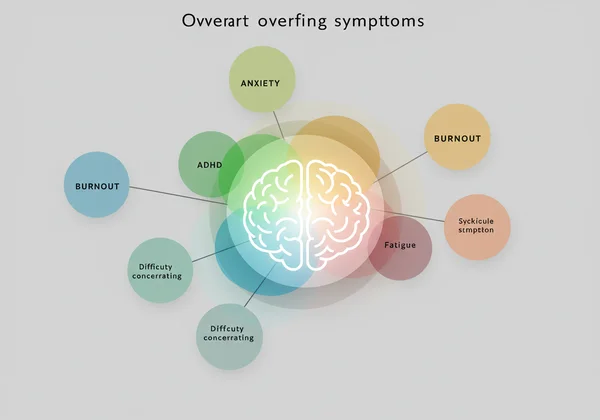Is It ADHD? A Guide to Conditions with Overlapping Symptoms Before Your ADHD Test
Do you find yourself constantly distracted, disorganized, or forgetful and wonder, "Do I have ADHD?" You're not alone. The journey to understanding your own mind can be confusing, especially when your symptoms seem to point directly toward Attention-Deficit/Hyperactivity Disorder. But while ADHD is a valid explanation for many, several other conditions share similar symptoms, leading to uncertainty before you take an ADHD test. This guide is here to help you understand five common conditions that can feel like ADHD, empowering you to take the right next step toward clarity.
Navigating this uncertainty is a crucial first step. While this article provides valuable information, a personalized screening can offer more specific insights. An online ADHD test can be a helpful tool to begin untangling your experiences before seeking professional advice. It helps focus your concerns and provides a structured starting point.
The Challenge of ADHD Misdiagnosis
The path to understanding attention-related challenges is often complicated by symptom overlap. Many people live for years with a misdiagnosis or no diagnosis at all, struggling with challenges they can't quite name. This is because the core difficulties associated with ADHD—like trouble with focus, organization, and impulse control—are not exclusive to the condition. Recognizing the possibility of an ADHD misdiagnosis is a vital part of a responsible self-discovery journey. It ensures you explore all possibilities and seek the correct support for your specific needs.
Why Do So Many Symptoms Overlap?
The key to understanding this overlap lies in a concept called executive functions. These are the high-level mental processes managed by your brain's frontal lobe that allow you to plan, focus, remember instructions, and multitask. They are essentially your brain's management system. When these functions are impaired, a state known as executive dysfunction occurs. ADHD is a primary cause of executive dysfunction, but it's not the only one. Stress, anxiety, depression, and other conditions can also significantly impact these cognitive skills, creating symptoms that look remarkably like ADHD.

The Importance of a Differential Diagnosis
In the medical world, a differential diagnosis is the process of distinguishing between two or more conditions that share similar signs or symptoms. This is precisely why a professional evaluation is so critical. A qualified healthcare provider doesn't just look for the presence of symptoms; they investigate the why behind them. They consider your full history, the context of your struggles, and rule out other potential causes. While an ADHD screening test is an excellent first step to see if your symptoms align with ADHD patterns, it's the professional who can perform a comprehensive differential diagnosis.
Deep Dive: 5 Conditions Similar to ADHD
![]()
Let's explore five common conditions that can masquerade as ADHD. Understanding these distinctions can bring you one step closer to identifying the true source of your challenges.
Anxiety Disorders: Is it Worry or Wandering Focus?
Anxiety and ADHD are frequent companions, and their symptoms can be incredibly difficult to tell apart. A person with an anxiety disorder might be unable to focus on a task because their mind is consumed by worry, fear, or a racing heartbeat. To an outsider, this looks just like the inattentiveness of ADHD.
- Overlap: Difficulty concentrating, restlessness, feeling "on edge," trouble sleeping, and physical fidgeting.
- Key Difference: The motivation behind the distraction. With anxiety, distraction is often driven by persistent worry about the past or future. With ADHD, the distraction is typically caused by a brain that is seeking stimulation or has difficulty filtering out irrelevant information, not necessarily rooted in fear. If you're unsure which pattern fits you, taking a confidential free ADHD test can help clarify if your inattention aligns more with ADHD traits.
Depression: Unpacking Apathy and Executive Dysfunction
The mental "brain fog" associated with depression is one of its most debilitating symptoms. This cognitive slowness, combined with a lack of motivation (apathy) and difficulty starting tasks, can look almost identical to the procrastination and inattentiveness seen in some forms of ADHD, particularly inattentive ADHD.
- Overlap: Difficulty concentrating, low motivation, memory problems, fatigue, and a feeling of being mentally "stuck."
- Key Difference: The emotional foundation. Depression is characterized by a persistent low mood, sadness, or a loss of interest in activities you once enjoyed. While people with ADHD can experience frustration or low self-esteem due to their challenges, the core issue is neurological regulation, not necessarily a pervasive state of hopelessness.
Autism Spectrum Disorder (ASD): Social Cues and Routines
ADHD and ASD are both neurodevelopmental conditions that often co-occur, but they are distinct. Difficulties in social situations can be a feature of both. A person with ADHD might interrupt others or miss social cues due to impulsivity or inattention. A person with ASD may find social interaction inherently confusing or overwhelming.
- Overlap: Challenges with social cues, intense focus on specific interests (hyperfocus), and sensitivity to sensory input.
- Key Difference: The underlying reason for the behavior. In ASD, there is often a strong preference for routine and predictability, and social challenges stem from a different way of processing social information. In ADHD, challenges are more often related to regulating attention and impulses. The "hyperfocus" in ADHD is often spontaneous, while in ASD, it tends to be part of a long-standing, deep interest.
Burnout: When Chronic Stress Masquerades as ADHD
In our fast-paced world, burnout is becoming increasingly common, especially among students and working professionals. Chronic, unmanaged stress depletes your cognitive resources, leading to a state of emotional and physical exhaustion. The symptoms of severe burnout can perfectly mimic those of adult ADHD.
- Overlap: Extreme mental fatigue, inability to focus, cynicism or detachment, procrastination, and feeling overwhelmed by simple tasks.
- Key Difference: The onset and context. Burnout develops over time as a direct result of overwhelming stress, often related to a job or specific situation. Its symptoms may lessen when the source of stress is removed. Adult ADHD, on the other hand, is a lifelong condition, with symptoms being present since childhood (even if they were not recognized). An adult ADHD test can be particularly useful for professionals wondering if their struggles are situational or a lifelong pattern.
Sleep Disorders: The Impact of Poor Rest on Attention
Never underestimate the power of sleep. Conditions like sleep apnea, insomnia, or restless leg syndrome can severely disrupt sleep quality. A sleep-deprived brain simply cannot function properly. The resulting daytime grogginess, irritability, and inability to concentrate can make you feel certain you have ADHD.
- Overlap: Difficulty paying attention, poor memory, irritability, impulsivity, and hyperactivity (in an attempt to stay awake).
- Key Difference: The root cause. If your attention problems are primarily due to a sleep disorder, they will be significantly improved once your sleep issues are treated. For those with ADHD, sleep problems are often a symptom or co-occurring issue, but treating the sleep problem alone won't resolve the core ADHD challenges.
Your Path to Clarity: What Are the Next Steps?
Understanding that your symptoms overlap with several conditions is the first real step toward clarity. It allows you to move beyond labels and discover the true root of your challenges. The overlap between ADHD and other conditions is complex, and self-diagnosis can lead you down the wrong path.
Your journey to clarity starts with gathering information. The most reliable first step you can take right now is to see how your personal experiences measure up against established screening criteria. Our platform provides a confidential, AI-powered analysis to help you understand your traits.

Ready to gain insight into your personal traits? Take our free ADHD test today and receive an instant, personalized report to guide your next steps.
Common Questions About ADHD and Related Conditions
Is ADHD a form of autism?
No, ADHD is not a form of autism. They are two distinct neurodevelopmental conditions with their own diagnostic criteria. However, they can have overlapping symptoms (like social challenges and sensory sensitivities) and it is common for an individual to have both. A professional evaluation is needed to distinguish between them or diagnose their co-occurrence.
What should I do after taking an online ADHD test?
After taking an online ADHD screening, view your results as a starting point for a conversation, not a final answer. Our personalized AI report is designed to be a useful tool you can bring to a healthcare professional, such as a doctor or therapist. It provides a structured overview of your traits that can help guide a more productive and informed discussion about diagnosis and support.
Can you really test for ADHD online?
It's important to distinguish between "screening" and "diagnosing." You can absolutely complete an effective ADHD screening online. A good screening tool, like the one offered on our site, uses questions based on scientific standards (like the DSM-5 criteria) to check for potential ADHD traits. However, a formal diagnosis can only be made by a qualified healthcare professional after a comprehensive evaluation. Our free ADHD test is a reliable, confidential first step in that process.